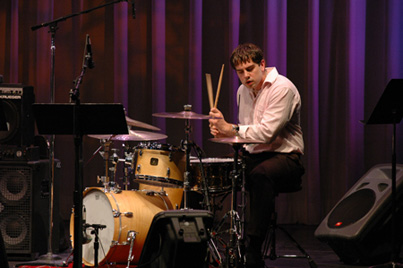A different drummer

Schulich School of Music Jazz Performance student Karl Schwonik recently took part in the Betty Carter Jazz Ahead program at the famed Kennedy Center in Washington D.C.
Courtesy of The Kennedy Center
It's a long way from Gwynne, Alta., to Carnegie Hall – literally and figuratively. And the journey from the small farming community in central Alberta to the stage of New York's Mecca of musical performance is even greater when you were born with a disorder robbing you of most of your vision.
Karl Schwonik is about to complete that unlikely journey. The 23-year-old, second-year Jazz Performance student at the Schulich School of Music was born with an ocular condition called congenital cone dystrophy that left him totally colour blind, with no depth perception and with only 10 per cent of his vision. But Schwonik hasn't let his visual impairment stop him, or even slow him down. In fact, he already has some impressive entries on his musical resumé. And he'll add another April 13 when he takes the stage at Zankel Hall inside the famed Carnegie Hall.
Schwonik, whose father was a viola-playing music teacher, first learned the violin at the age of five. He took up percussion at Gwynne School, where his father was the musical director. By his early teens, Schwonik abandoned the violin to concentrate on the drums full-time. Taking up the drums, he said, was liberating, as his limited eyesight made the reading of sheet music required for most other instruments extremely challenging.
"I don't really read music like everyone else does. What I do is recognize shapes and figures," Schwonik said. "There are only a few ways to write a certain figure, and with practice you can tell the shape of it.
"When I switched over to drums it was so great, because you can learn more on drums from listening than reading – which was a big thing for me. I could listen to a rock album and I could learn the drum part and that would really help me. And jazz is the same way. The tradition of jazz is very oral, and as a drummer you're not necessarily expected to read music. That's a great thing about being in this genre."
Schwonik has, however, had to deal with the challenge of reading sheet music, first at the prestigious Banff Centre, where he was the youngest artist ever to take part in the long-term residency program, and later at McGill. He uses a computer equipped with special programs to help him read and write and use the Internet, but sometimes has trouble with school work requiring him to read sheet music.
"It's a constant struggle for me," Schwonik said. "Sometimes I have to work many more hours than my peers do, because when they hand out an assignment with examples, I can't read them. It takes me a long time and it can be really tiring too."
Driven to succeed
Schwonik makes up for his lack of vision with hard work and extraordinary ambition and drive. He regularly applies for scholarships and awards, a number of which have helped take some of the financial pressure off studying far from home. He returns to Alberta every summer, playing festivals and lining up club gigs with his own jazz trio. He also spends part of the summer teaching at a jazz camp in Connecticut, an experience he said has helped him make contacts with many important jazz figures in the northeast, one of the most important centres of jazz music in North America.
Schwonik recently returned from a two-week workshop at another famous cultural venue, Washington D.C.'s Kennedy Centre. He applied for and was selected to participate in the Betty Carter Jazz Ahead program, where he and 26 other young talents took part in a series of workshops and clinics given by a number of American jazz luminaries. The program culminated with four performances on the Centre's Millennium Stage before audiences of more than 3,000.
"We performed all original compositions, which was the focus of the program," Schwonik said. "Basically there were two criteria to get in: are you a composer and do you have a facility with your instrument."
If he can make it there...
This coming weekend, Schwonik heads to New York in preparation for his participation in a similar program at Carnegie Hall. But before it gets under way, he is booked to play a show in a Greenwich Village jazz club, where he'll sit in with award-winning jazz guitarist Paul Bollenback. On April 8, Schwonik reports to Carnegie Hall to take part in the five-day David Krakauer Workshop: Exploring Klezmer for Individuals and Chamber Ensembles.
He and approximately 20 other specially selected, advanced jazz and klezmer musicians will explore traditional, experimental and classically set klezmer music under the direction of renowned clarinetist David Krakauer. The workshop wraps up with a concert at Zankel Hall on April 13.
Montrealers have one final opportunity to see Schwonik play before he heads back to Alberta for a series of concerts in Edmonton and Calgary in May. His Karl Schwonik Quartet, featuring Joel Miller and noted Montreal jazz pianist and McGill music teacher Jeff Johnston, plays on Sunday, April 30, at Upstairs Jazz Club.
You can hear some samples of Karl Schwonik's playing and find more information, including a list of his upcoming appearances, on his MySpace site.

